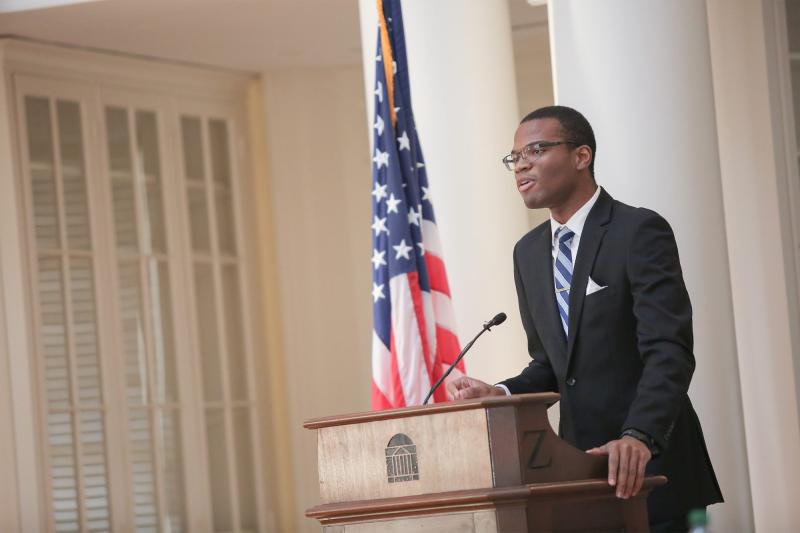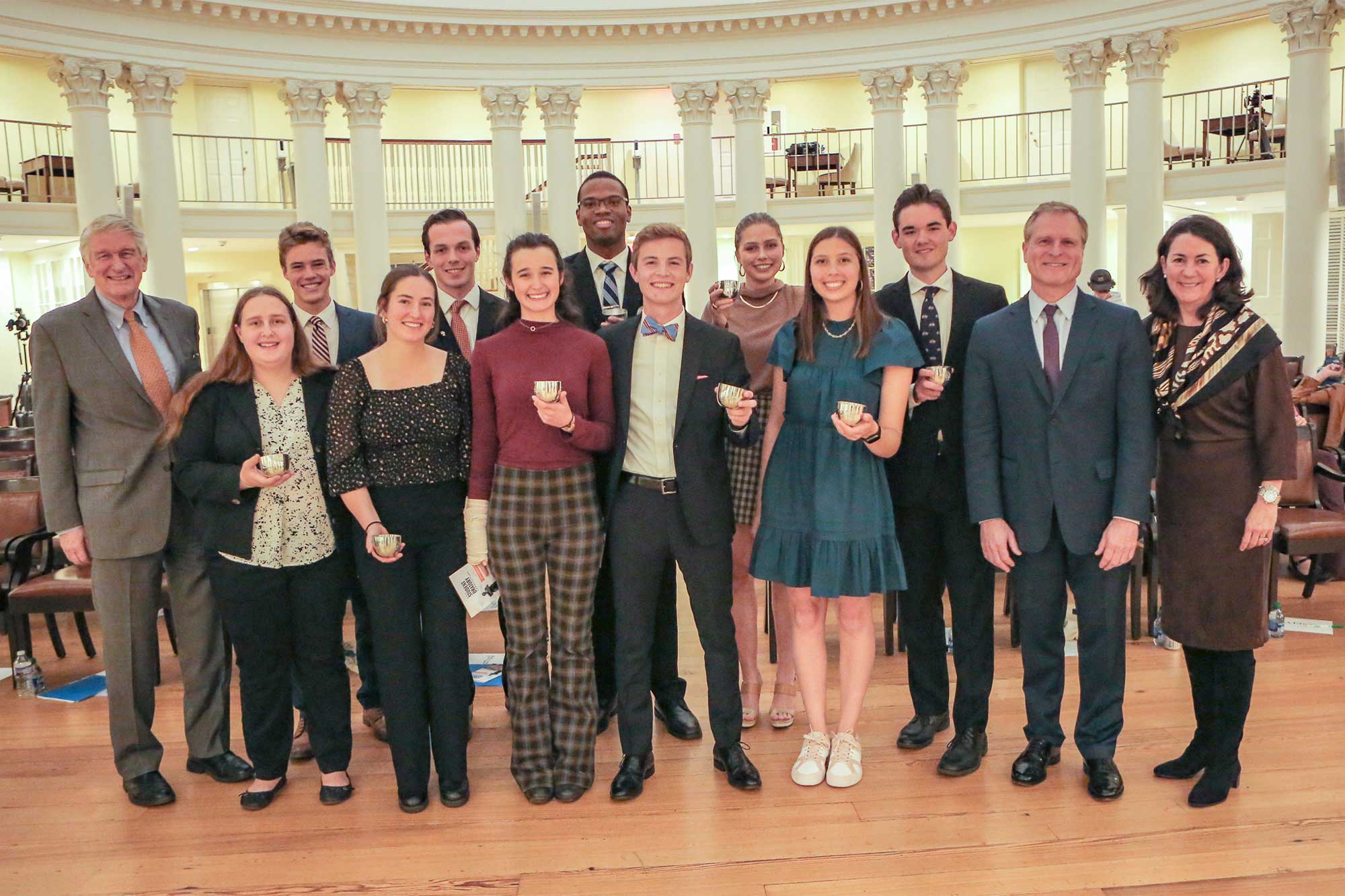Student’s ‘Remedy To Save America’ Speech Earns Top Honor at Oratory Contest

The University of Virginia’s Department of Politics on November 3 hosted its second annual Oratory Competition inside the Dome Room of the historic Rotunda.
Jered Cooper, a third-year student and government major from Fort Washington, Maryland, won the competition and a $500 prize. All 10 finalists presented their speeches using the same prompt (“Is free speech important at a public university in our democracy – and why?”) before a panel of judges that included former presidential speechwriters Clark Judge (Ronald Reagan) and John McConnell (George W. Bush), and politics department chair – and Miller Center senior fellow – Jen Lawless. Lawless filled in for Kyle O'Connor, a former speechwriter for Barack Obama, who missed the event due to an illness.
Participants were judged on their speechwriting ability and quality of delivery.
The competition was sponsored by UVA’s Department of Politics Honors Program, the Karsh Institute of Democracy, Think Again @ UVA, the Jefferson Literary & Debating Society, the University Democrats and the College Republicans. It was organized by a committee of students – Aly Buckner, Mark Graff, Clay Vaughn and Jeremy Odrich – and faculty adviser Mary Kate Cary, a politics adjunct professor, Miller Center senior fellow and former speechwriter for George H.W. Bush.
Students entered the competition by submitting a six-minute speech on this year’s prompt. From there, 10 finalists were chosen and invited to the Dome Room for a final presentation. While Cooper emerged as the winner, each finalist received an engraved silver Jefferson Cup.
Below is the full transcript of Cooper’s speech, titled “A Remedy to Save America.”
“In these difficult years, America has suffered from a fever of words; from inflated rhetoric that promises more than it can deliver; from angry rhetoric that fans discontents into hatreds; from bombastic rhetoric that postures instead of persuading.”
When were these words spoken? If you guessed today, you would be mistaken. This quote comes from United States President Richard Nixon’s inaugural address delivered on Jan. 20, 1969. At that moment, the country was recovering from the chaos of 1968, the war in Vietnam was continuing to lose American lives, and the national mood was one of hostile partisanship; much like today. The past two decades of this century have seen an increase in political strife. The experiment of the United States has been tested increasingly by the words of its citizens. We as a nation seem to have collectively forgotten something that is key to a healthy democracy: free speech.
“Free speech” is a term that gets tossed around like a Frisbee quite often today. As political divisions harden, we as a country cannot even agree on what constitutes free speech. Our federal union is comprised of 50 states; laboratories of democracy. Within these laboratories are its public universities; the greenhouses for tomorrow’s leaders. Yet, across campuses, there is a disturbing trend of censorship occurring. Colleges, fearful of inflaming the ills that have plagued our society, have declined to allow all voices a seat at the table of learning. I feel the result has been and will continue to be disastrous for every student, and it may do a grave disservice to higher education.
Ten finalists, three judges and a faculty adviser (Mary Kate Cary, far right) were in the spotlight Thursday night inside the Dome Room.
Ideas matter. Words matter. How we express ourselves as a people is a sign to the world. The question is whether or not we will show strength or weakness. My concern is that a restriction of the First Amendment will convey weakness. Universities have long been places for youth to gain exposure to ideas that they may have never encountered. Some students exit having undergone a political or ideological awakening; others leave indifferent. The tie that binds them is that they graduated having heard all sides.
From the towering pine trees of Maine to the majestic hills of California, the United States is a diverse group in thought. As a young person, I have come to university to learn how to help my fellow citizens, and I have met dozens of classmates who share the same dreams. Yet, how can we help our countrymen if we do not consider how they feel? Any censorship of speech harms the ability of people to understand. We cannot help others unless we acknowledge their motivations. Unfortunately, there are those who believe the feelings of some have no place on a college campus.
Those in favor of a form of university censorship say it is to prevent giving a platform to “dangerous ideas” that have no place in higher education. However, what constitutes a “dangerous idea” is relative. In some instances, such an idea is simply one unpopular with the majority. When the majority uses its power in a way to prevent the opposition from sharing, everyone loses; a perspective is not gained.
Opponents of my viewpoint say that giving a platform to dangerous ideas is criminal, but I disagree. We already have laws that protect from the most radical theories. The fundamental right of free speech is not absolute; you cannot yell “Fire!” in a crowded movie theater when there is no fire. Providing a civilized forum for people to discuss topics does not mark the end as we know it, but rather the beginning. When we censor respectful dissent, when we silence the loyal opposition, when we decline to open the doors of deliberation to all good faith participants; we cut off the lifeblood of this republic.
People need to be able to respectfully disagree. Each time an idea is challenged, it becomes stronger after scrutiny. No one group holds the solution to the dilemmas of our time. Universities should remain a place where ideas can be challenged, deliberated, and understood. There should be a forum where opinions can be shared civilly without the threat of violent escalation. Understanding someone does not equal agreement, but rather yields compassion and goodwill, which America greatly needs today.
To break the fever of words currently afflicting our republic, we should begin to listen to each other. It is imperative we allow all to share their views so as to promote understanding. There is no better place for this change to begin than at our universities. There, future leaders are prepped to solve the complex challenges of tomorrow, and it is up to us to meet the moment. The solutions to our nation’s problems have always been found within the energy and spirit of its citizens. Free speech needs to be brought back to the forefront and leading the charge ought to be the public universities of this great country.










